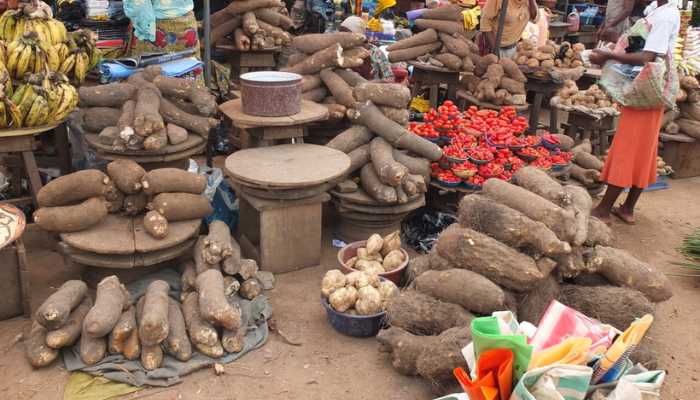Food price drop offers rare relief for families
The recent drop in food prices across Nigeria has brought the much-needed relief to households who have been grappling with the rising cost of living.
The fall in food prices is driven by an ongoing harvest season, better climate for farmers, improved security, and a surge in cheap imports backed by a free import waiver granted by the federal government last year.
A BusinessDay market survey across major cities in Nigeria shows that prices of food staples have dropped by an average of 30 percent year-on-year.
Read also: Benue records highest food price surge in 5yrs as insecurity worsens
In Lagos, findings reveal that a 50kg bag of local parboiled rice now sells for an average of N65,000 against N73,000 in October 2024, reflecting a 11 percent drop in price. It now costs N62,000 for a 50kg bag of foreign parboiled rice as against N82,000 in October 2024, indicating a 24 percent drop.
Prices of a big basket of tomatoes have dropped 30 percent in Lagos from an average of N50,000 in October last year to N35,000 currently.
In Abuja, prices of a 50kg bag of local parboiled rice that sold for N75,000 last October have fallen by 16 percent to N63,000.
Similarly, a four-litre container of white garri now sells for N1,600 from an average of N4,000 in October last year, indicating a 60 percent drop in price. In Abuja, a small bucket of rice, popularly called ‘mudu,’ now sells for an average of N2,500 against N5,000 last October.
The price reductions have elicited excitement among Nigerians who now say they can once again afford a balanced diet.
Ogechi Chimereme, a pharmacist in Lagos Island, said she feels relieved that food prices are falling. “I am so happy that food prices are dropping. I wish it would keep coming down.
“I went to the market recently and was surprised at the new prices of vegetable oil, a bag of rice, and other items,” she said, beaming with joy. “I was even able to buy more than I budgeted for.”
She told BusinessDay that her family had previously been burdened with the weight of food prices. “Before this relief we are seeing, I had increased my feeding budget because my usual amount could no longer meet my family’s needs.”
Chimereme is one of many individuals in Nigeria that are finding respite from the ease in food prices.
Esther Ejiro (not real name), a fruit seller at Berger in Lagos, said she hopes that the drop in food prices will continue. “I’m so happy food prices are coming down,” she said.
Nigeria experienced its worst cost-of-living crisis in 2024 when food prices surged to a record high in June to 40.87 percent, driving headline inflation to 34.19 percent within the period.
However, food inflation has considerably eased, sliding to 16.87 percent in September 2025, according to the most recent CPI data.
Read also: Food prices drop slightly in Abuja but still high for residents
“This outsized food inflation decline may have been partly prompted by the recent material drop in market food prices and easing security concerns,” a report by Cardinal Stone, a multi-asset investment management firm, noted.
Olu Mayowa, a civil servant and father of three, explained how his family is taking advantage of the drop-in food prices.
According to him, “These days, the money I give to my wife can now buy more food items as opposed to before. So, she buys the same things, but in larger quantities.”
“I’m happy about that,” he added.
For a country where people spend over 50 percent of their salaries on food, according to several studies, the ease in food prices has brought relief and hope to cash-strapped Nigerians.
Iyi Lawale, an accountant in Lagos, said a lot of families can now better feed their children. “I don’t think food should still be a problem for a country like Nigeria. But food prices are coming down now, which is a good thing.”

